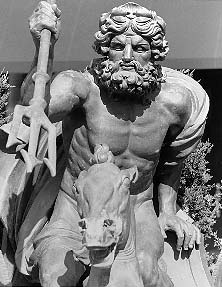Let’s Change the Culture
 Monday, June 25, 2007 at 05:06PM
Monday, June 25, 2007 at 05:06PM  Changing a culture borders on the impossible. People identify deeply and strongly ethnic, regional or national traits, and they usually resist any attempt to dislodge them from their culture with a visceral reaction. Imagine how Americans would react if, for example, we were made to drive on the left side of the street instead of the right. What if Canadians were told they had to say “owt” instead of “oot”; or if New Englanders were told they had to say “Cuba” instead of “Cuber”; or if southerners were forbidden to say “ya’ll”? None of us would stand for it.
Changing a culture borders on the impossible. People identify deeply and strongly ethnic, regional or national traits, and they usually resist any attempt to dislodge them from their culture with a visceral reaction. Imagine how Americans would react if, for example, we were made to drive on the left side of the street instead of the right. What if Canadians were told they had to say “owt” instead of “oot”; or if New Englanders were told they had to say “Cuba” instead of “Cuber”; or if southerners were forbidden to say “ya’ll”? None of us would stand for it.
Other issues, however, must be considered more seriously. For example, the Corinthian church clung stubbornly to their pagan roots of immorality and idol worship, despite the powerful experience of conversion through the name of Jesus and the Holy Spirit. They did not have a Jewish heritage to bring great conviction upon them concerning these issues. Elsewhere, Jewish Christians could not easily break from the past traditions of their Judaist upbringing. In the epistle to the Galatians, the Apostle Paul addressed the conflict between their bondage to Jewish practices and the liberty through the cross. Although he eventually triumphed in his quest, it was not without great agony and upheaval within the church.
People may be persuaded to accept a superior view from a logical standpoint, but they will rebel emotionally against that very logic. They despise holding opposing views against their traditions. They don’t want to be branded as different by their peers, and they dislike getting pushed out of their “comfort zone” or the familiar ruts that seemed to have worked for them in the past. These decisions descend from the heart, not the mind.
Success in changing the culture can only be achieved with committed and patient efforts of leadership. First, the idea must be patently superior to the present practice. Second, it must be skillfully articulated with great force and resolve. Last, it must be supremely resistant to the huge backlog of inertia that it will certainly encounter.
The United Pentecostal Church , International operates within the parameters of its own culture. Some of our defining earmarks grow out of our historical commitment to Apostolic doctrine and Bible holiness. Other characteristics, however, have evolved in obscure ways that may be difficult to understand. From time to time, we get shocked or shamed into a necessary look at our culture. We should come away from such revelations with a new resolve to change paradigms and behavior patterns that impede our mission and vision. Here is a starter list of areas that desperately need to be changed in our culture of faith.
Children. We must find better ways to impart Apostolic values to our children. The gush of evil influence from the world will not be met with a trickle or token from our teaching resources. Our renewed efforts must involve whole families, Sunday school programs, mentoring, planned activities and other efforts whose primary goal is to instill Apostolic values.
Missions. Missions must not continue to be something someone else does. It has to be what we do personally. The youth of some organizations spend two entire years of their lives in missions work. Others push their adherents to witness and sell literature with a zealot’s intensity. Whatever we do, we must imbue our emphasis on missions with sustained commitment and a unflagging campaign to keep it in front of us.
Vision. The primary process of the church is growth, both in quality and quantity. Jesus said, “I will build my church.” Building implies expansion, outreach, positive change and investment. We cannot marginalize our vision for growth into a whining or wishes. It must become a basic tenet of our faith and implemented with driving conviction.
Sacrifice. The church in the wilderness did not offer sacrifice to God on a whim. They planned and prepared sacrifices on a regular basis, because that’s what God required. Today, our culture of emotional, high-pressure kind of giving puts God under the thumb of our feelings and carnal calculations. Think of the power the church would generate with across-the-board, planned sacrificial offerings.
Discipleship. Too many in the Apostolic ranks think of discipleship as a to-do list. Instead of an attitude of Christ-likeness, it has become a superficial template that measures only observable traits. We need a paradigm shift so that our focus centers on the emulation of Christ.
Change your culture. Choose some area of your life or church that has stagnated into uselessness. Throw all your weight behind making the kind of change that restructures lives. When you affect the way you and others think, you will break into a brand, new world.

Reader Comments